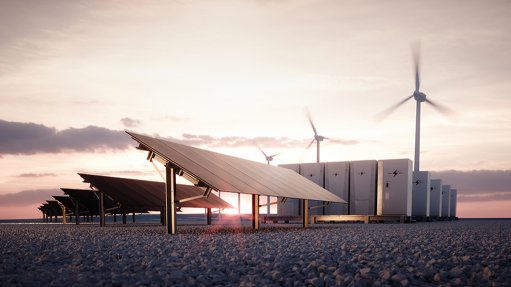
CONSIDERATIONS The deployment of BESSs in South Africa’s current constrained system must focus on unlocking opportunities from additional generation sources
Amid a widening energy generation deficit, brought on by the declining performance of State-owned power utility Eskom’s coal fleet, economics consultancy Meridian Economics energy analyst Dr Peter Klein argues that numerous forms of new generation and storage capacity are urgently needed to reduce loadshedding.
“As the intensity of loadshedding has escalated, we have moved away from being short of generation capacity for limited periods, to loadshedding throughout the day,” he says.
At that margin, Klein says the addition of any new energy, be it variable or dispatchable, can have a significant impact on reducing loadshedding.
As a result, he contends that the deployment of battery energy storage systems (BESSs) in South Africa’s current constrained system must focus on unlocking opportunities from additional generation sources, as BESSs are net consumers of energy owing to roundtrip efficiency losses that are associated with such systems.
These additional short-term opportunities enabled by BESSs can include, for example, implementation of a BESS as a means of addressing grid constraints and curtailment, or to free up pumped hydro storage from some reserve requirements.
Ultimately, as the penetration of variable generation increases, a mix of BESSs, peaking plants and demand response measures will be required in South Africa’s energy mix.
Hence, Klein suggests that decentralising storage locations can allow for more value streams to be captured, whereby BESSs can capture different value streams in different locations on the grid, thus improving their business case.
“Ultimately, we need to find ways of monetising these value streams and of incentivising customers to deploy storage using a decentralised approach,” says Klein.
He notes, however, that decentralising storage requires mechanisms and incentives to provide a degree of control to the system operator, either directly or through aggregators.
“As we have seen with private sector decentralised wind and solar photovoltaic projects, this can allow for a significant increase in the speed of deployment when compared to centralised procurement, assuming there are the correct market signals for customers to make an investment into storage, given the associated costs,” Klein contends.
Additionally, South Africa’s specific crime-related challenges also impact on the effective decentralisation of storage assets as it is, theoretically, easier to protect centralised assets from, for example, theft and vandalism.
It is, therefore, crucial for consumers to understand the relevant use cases, or applications, for BESSs, which will, in turn, allow for a greater understanding of the economic value that can be derived from stored energy, thereby improving the business case for storage.
“The question of monetising different value streams and stacking them on top of one another is use-case specific and it is important to note that different forms of energy storage are suited to different applications. It is not a one-size-fits-all type of situation,” he cautions.
However, while there is growing interest in BESSs, Klein notes that other alternative technologies, such as thermal storage, are available to store energy.
For example, considering many households in South Africa use uncontrolled geysers that contribute to peak energy demand, he says there is an opportunity to coordinate the switching on and off of geysers.
He cites a study, conducted in 2017 by the University of the Witwatersrand (Wits), regarding the decentralised use of electric water heaters as a flexible demand response using a control box that monitors electricity frequency.
The study, conducted by Wits master’s student Douglas Cooper, analyses how water heaters can operate as flexible loads while being a lower-cost energy storage solution for consumers.
“There are various opportunities to implement these low-cost solutions that can achieve the same outcome as batteries, and there is a massive potential for geysers to act as a thermal battery and provide more flexibility for the grid,” Klein concludes.